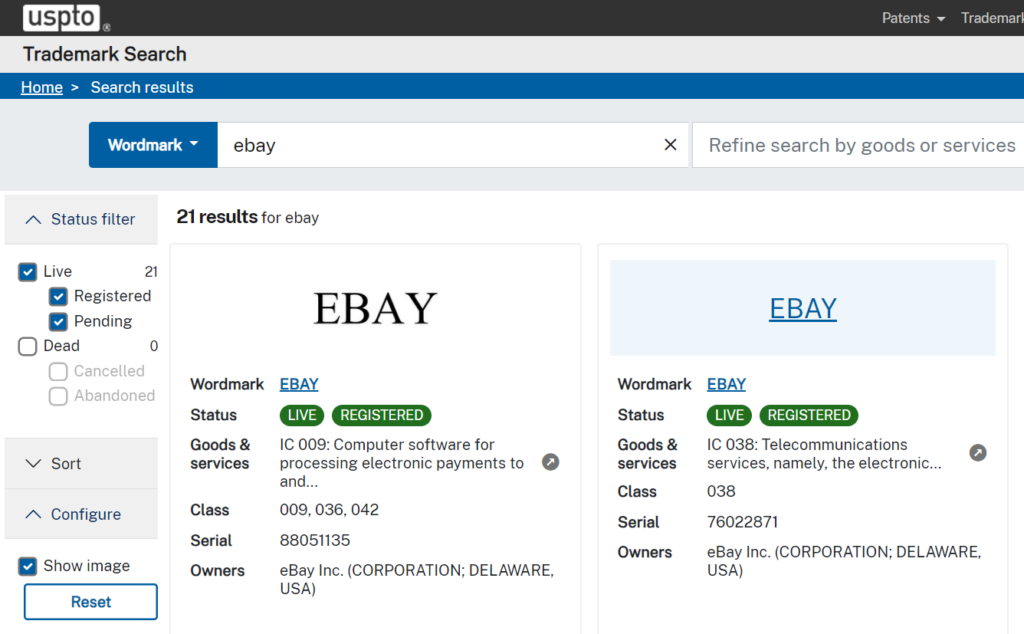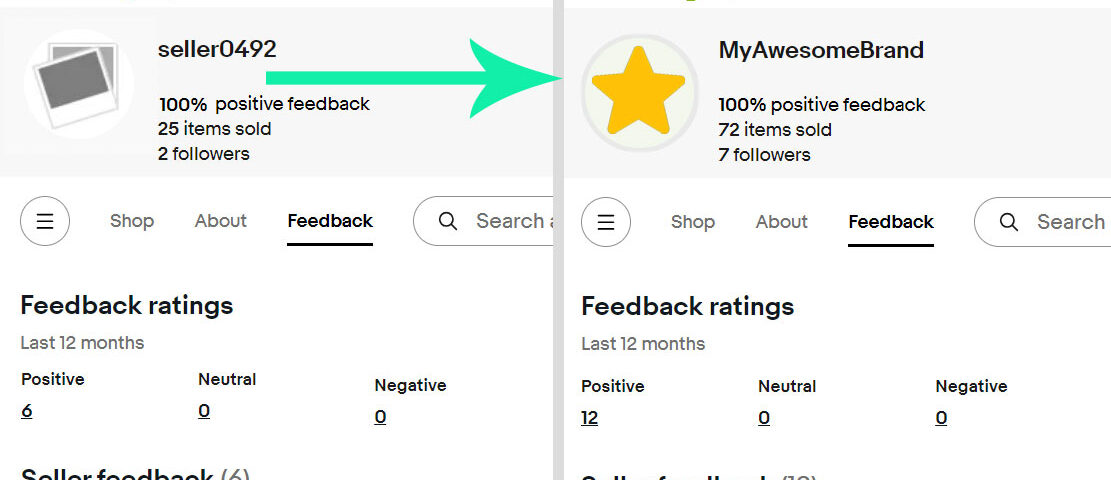Most sellers on eBay don’t put much thought into their name. If you have a username that looks spammy or doesn’t make sense for your niche, it’s possible buyers are passing up your item for someone a little more reputable.
With over 18 million active sellers on eBay, it can be hard to stand out from the crowd. One way you can achieve a more professional look and make it easier for you to promote your listings is with a good brand name and matching domain.
By making just a few simple changes to your username and profile icon, you can create a more trustworthy appearance for your customers, giving them more confidence in choosing you over another seller.
Changing your username on eBay is easy and straightforward, but coming up with a good name that you can actually use is the hard part. In this guide, we will provide a simple roadmap that will lead you to finding your perfect name.
If you are an established seller with a name you are already happy with, you can move straight to trying to acquire a matching domain for your profile. Skip to below Hurdle 3 and take special consideration of the type of domain extension you choose.
Creating a Brand Name on eBay
There is a strict criteria all users must follow on eBay when creating their username. We have the basics covered here, but the official eBay policy may have changed since the time of writing, so be sure to check up on the latest regulations.
Because we are creating a brand name, we want to avoid using special characters. Numbers should also be avoided as they can be confusing, but they are allowed to be used in both eBay usernames and domain names.
With that in mind, here are the four main boxes you need to check when coming up with a name:
Hurdle 1: Your name can’t already be taken on eBay
This is obviously the first hurdle and it can be fairly complicated to overcome. eBay has been in business since 1995, and just like real domain names, a eBay username is unique, and many of the good ones have already been taken. You can still find quality names that are available, it just takes more time and effort than it did in the early days.
There are several brand generator tools online that can help you think of ideas:
- Atom Name Generator
- Namelix Brand Name Generator
- NameMaxi Name Generator
- Netidex Brand Name Generator
Hurdle 2: Your name can’t be confused with another eBay user
One major part of the eBay username policy is that you cannot have a name that may be mistaken with another user. This helps protect buyers from confusion and sellers from impersonators.
- Avoid words with singular/plural combinations. Think “greatdeal” vs “greatdeals”. Singular is usually better but not always.
- Avoid word swaps. The positioning of a word can change the meaning and feeling of a name. Think “BetterDeal.com” vs “DealBetter.com”; the latter just doesn’t make sense for a store. It would make more sense for a gambling-related site.
Check to see if a eBay username is taken with: https://ebay.com/usr/[username-you-want]
Hurdle 3: Your name can’t contain a trademarked phrase
Use the United States Patent and Trademark Office Search System to check for your desired phrase. The safest bet is to avoid any name that returns results, but this can be difficult.

If the name you really want is taken, it can still be used if you are running a completely different type of business. Trademarks are only valid for the country and class of goods or services in which they are registered.
Of course, you should always consult a lawyer if you want to take the risk of using a trademarked name. These laws can be very complicated, and dealing with conflicts can be more trouble than it’s worth.
Hurdle 4: Your name must be available as a domain
Once you’ve established your name is available on eBay and is not a registered trademark in your industry, it’s time to get a matching domain to forward to your listings. This will make it easier for people to find you by word of mouth.
Instead of saying “look up (your name) on eBay” or linking to ebay.com/usr/yourname, you will advertise “mydomain.tld”, and this will forward them to your profile on eBay automatically!
Do I need an exact brand name match for my domain?
Not exactly, but it’s ideal. You should most certainly try to register your exact brand name if possible, even if it’s only available in a less popular extension. You can still purchase a second domain in a more reputable extension that can be used for advertising purposes.
If you can’t get the .com in your exact name, it’s okay because you still have some options. The first thing would be to determine what is the best alternative extension for your profile.
For example, if abcshopping.com is not available, you can register abcshopping.co to secure a domain with your exact name. Optionally, you can purchase a more generic name, such as shopgreatdeals.com, and use that for your advertising. This will give you the credibility of .com while still allowing you to have a domain that matches your name.
What are the most credible domain extensions?
Domain extensions have meaning, and choosing the wrong one could convey a completely inaccurate message about your business.
Related: The Evolution of TLDs: Understanding Their Role in Online Branding
If you are a US-based seller, a .US domain extension is very fitting and still gives your brand a lot trust and credibility. You will need to display your business information in the public registry for this domain, so this is only suitable if you have a PO box or physical location where you ship from.
For more privacy and international reach, going with .CO is another great choice. Many startups and small businesses are favoring the .co TLD because .coms are hard to find. The problem with .co is people tend to add the “m” and type “.com” out of habit, which makes it harder for users to find you.
.store is a good extension that makes a lot of sense for an eBay seller, but it can be perceived as spammy if you don’t have a more reputable extension and social proof to back it with.
.net is a very reputable extension choice for tech-related sellers, but not many e-commerce companies operate on this TLD. It is better suited for networking and collaboration sites. You can help combat this bias by adding a subdomain such as shop.mydomain.net.
.org is generally associated with non-profit organizations and should not be used for retail or reselling unless a large portion of your sales go to charity or you have a strong focus on serving your local community.

How do I register a domain?
Once you have decided on your name, see what’s available by searching it with any credible registrar. We have included some links below to get you started:
From here, whichever provider you choose will guide you through the remaining steps to make you the domain owner.
How do I forward my domain to my eBay?
Domain forwarding is configured through the company you register with. Most companies make this very easy from their domain control panel. You will want to set up a “Wildcard” redirect, which will send all traffic coming to your domain (including subdomains) to a single URL (your eBay profile page).
Whether you’re a budding entrepreneur, an aspiring influencer, or simply looking to establish a cohesive online identity, domain forwarding provides a flexible and efficient solution to enhance your online presence and strengthen your brand recognition.
Related: Domain Forwarding 101: Everything You Need to Know to Get Started
Building Your Online Empire
Creating a unique brand name on eBay can improve your credibility and visibility in a sea of sellers. By carefully navigating the hurdles of a unique username, avoiding confusion with other users, and ensuring your chosen name isn’t trademarked, you lay the foundation for a distinctive online presence.
Securing a matching domain, preferably with a reputable extension tailored to your business type and target audience, further solidifies your brand identity and makes it easier for people to find you.
Registering your domain and seamlessly forwarding it to your eBay profile completes the process, offering a streamlined pathway for customers to find and engage with your products.
Through these steps, you not only differentiate yourself from competitors but also foster trust and confidence among buyers, ultimately paving the way for continued success.
You May Also Like
- ChatGPT Tips for Domain Investors
- Secure Your Brand Name on the Blockchain with Coinbase ID: Here’s How
- Domain Authority 101: What Every Website Owner Should Know
- Maximizing Sales through E-mail Marketing: Tips and Strategies
- Restoring Original Visitor IPs with mod_remoteip in Apache on Ubuntu/Plesk/HestiaCP
